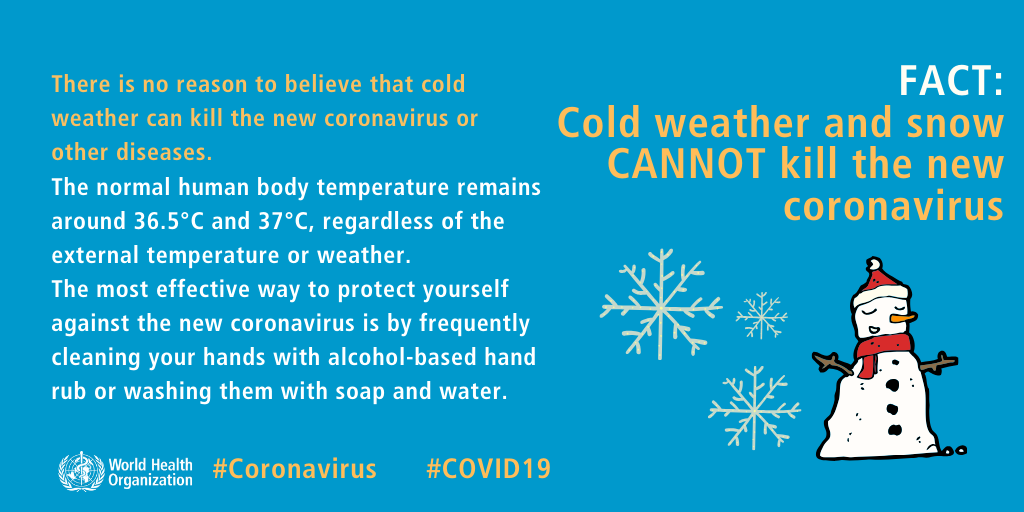Coronavirus disease (COVID-19) is an infectious disease caused by the SARS-CoV-2 virus.
In recent weeks, an outbreak of JN.1 sub-variant of COVID-19 is reported across the globe with the new cases being confirmed in Nepal as well.
The Ministry of Health and Population (MoHP) has urged one and all to adopt preventive measures and avoid unnecessary gatherings.
Most people infected with the virus will experience mild to moderate respiratory illness and recover without requiring special treatment.
However, some will become seriously ill and require medical attention. Older people and those with underlying medical conditions like cardiovascular disease, diabetes, chronic respiratory disease, or cancer are more likely to develop serious illness. Anyone can get sick with COVID-19 and become seriously ill or die at any age.
The best way to prevent and slow down transmission is to be well informed about the disease and how the virus spreads.
Protect yourself and others from infection by staying at least 1 metre apart from others, wearing a properly fitted mask, and washing your hands or using an alcohol-based rub frequently. Get vaccinated when it’s your turn and follow local guidance.
The virus can spread from an infected person’s mouth or nose in small liquid particles when they cough, sneeze, speak, sing or breathe.
These particles range from larger respiratory droplets to smaller aerosols. It is important to practice respiratory etiquette, for example by coughing into a flexed elbow, and to stay home and self-isolate until you recover if you feel unwell.
Here are some facts regarding the disease:
FACT: Hand sanitizers can be used often
An alcohol-based sanitizer does not create antibiotic resistance. Unlike other antiseptics and antibiotics, pathogens (harmful germs) do not seem to develop resistance to alcohol-based sanitizers.
FACT: Alcohol-based sanitizers are safe for everyone to use
Alcohols in the sanitizers have not been shown to create any relevant health issues. Little alcohol is absorbed into the skin, and most products contain an emollient to reduce skin dryness.
Allergic contact dermatitis and bleaching of hand hair due to alcohol are very rare adverse effects. Accidental swallowing and intoxication have been described in rare cases.
FACT: Alcohol-based sanitizers can be used in religions where alcohol is prohibited
Any manufactured substance developed to alleviate illness or contribute to better health is permitted by the Qur’an, including alcohol used as a medical agent
FACT: The amount of alcohol-based sanitizer you use matters
Apply a palmful of alcohol-based sanitizer to cover all surfaces of your hands. Rub your hands together using the right technique until they are dry.
The entire procedure should last 20-30 seconds.
FACT: It is safer to frequently clean your hands and not wear gloves
Wearing gloves risks transferring germs from one surface to another and contaminating your hands when removing them. Wearing gloves does not replace cleaning hands. Health workers wear gloves only for specific tasks.
FACT: Touching a communal bottle of alcohol-based sanitizer will not infect you
Once you’ve sanitized your hands, you have disinfected them from any germs that may have been on the bottle. If everyone uses sanitizer in a public place such as a supermarket entrance, the risk of germs on communal items will be lower and will help keep everyone safe.
FACT: An alcohol-based handrub is listed as a WHO essential medicine
Clean hands protect patients, health workers, other caregivers and everyone from infection. Cleaning your hands is one of the key measures to prevent disease.
FACT: Vitamin and mineral supplements cannot cure COVID-19
Micronutrients, such as vitamins D and C and zinc, are critical for a well-functioning immune system and play a vital role in promoting health and nutritional well-being. There is currently no guidance on the use of micronutrient supplements as a treatment of COVID-19.
Is dexamethasone a treatment for all COVID-19 patients?
Dexamethasone should be reserved for patients who need it most. It should not be stockpiled.
It provided no improvement for patients with mild symptoms. Dexamethasone is a corticosteroid used for its anti-inflammatory and immunosuppressive effects.
For some COVID-19 patients on ventilators, a daily 6 mg dose of dexamethasone for 10 days improved their health.
Fact: Water or swimming does not transmit the COVID-19 virus
The COVID-19 virus does not transmit through water while swimming. However, the virus spreads between people when someone has close contact with an infected person.
WHAT YOU CAN DO:
Avoid crowds and maintain at least a 1-metre distance from others, even when you are swimming or at swimming areas.
Wear a mask when you’re not in the water and you can’t stay distant. Clean your hands frequently, cover a cough or sneeze with a tissue or bent elbow, and stay home if you’re unwell.
FACT: The likelihood of shoes spreading COVID-19 is very low
The likelihood of COVID-19 being spread on shoes and infecting individuals is very low. As a precautionary measure, particularly in homes where infants and small children crawl or play on floors, consider leaving your shoes at the entrance of your home.
This will help prevent contact with dirt or any waste that could be carried on the soles of shoes.
FACT: The coronavirus disease (COVID-19) is caused by a virus, NOT by bacteria
The virus that causes COVID-19 is in a family of viruses called Coronaviridae. Antibiotics do not work against viruses.
Some people who become ill with COVID-19 can also develop a bacterial infection as a complication. In this case, antibiotics may be recommended by a healthcare provider.
There is currently no licensed medication to cure COVID-19. If you have symptoms, call your healthcare provider or COVID-19 hotline for assistance.
FACT: The prolonged use of medical masks* when properly worn, DOES NOT cause CO2 intoxication nor oxygen deficiency
The prolonged use of medical masks can be uncomfortable. However, it does not lead to CO2 intoxication nor oxygen deficiency.
While wearing a medical mask, make sure it fits properly and that it is tight enough to allow you to breathe normally. Do not re-use a disposable mask and always change it as soon as it gets damp.
* Medical masks (also known as surgical masks) are flat or pleated; they are affixed to the head with straps or have ear loops.
FACT: Drinking alcohol does not protect you against COVID-19 and can be dangerous
The harmful use of alcohol increases your risk of health problems.
FACT: Adding pepper to your soup or other meals DOES NOT prevent or cure COVID-19
Hot peppers in your food, though very tasty, cannot prevent or cure COVID-19. The best way to protect yourself against the new coronavirus is to keep at least 1 metre away from others and to wash your hands frequently and thoroughly.
It is also beneficial for your general health to maintain a balanced diet, stay well hydrated, exercise regularly and sleep well.
FACT: Spraying and introducing bleach or another disinfectant into your body WILL NOT protect you against COVID-19 and can be dangerous
Do not under any circumstance spray or introduce bleach or any other disinfectant into your body. These substances can be poisonous if ingested and cause irritation and damage to your skin and eyes.
Bleach and disinfectant should be used carefully to disinfect surfaces only. Remember to keep chlorine (bleach) and other disinfectants out of reach of children.
FACT: Exposing yourself to the sun or temperatures higher than 25°C DOES NOT protect you from COVID-19
You can catch COVID-19, no matter how sunny or hot the weather is. Countries with hot weather have reported cases of COVID-19. To protect yourself, make sure you clean your hands frequently and thoroughly and avoid touching your eyes, mouth, and nose.
FACT: The COVID-19 virus can spread in hot and humid climates
The best way to protect yourself against COVID-19 is by maintaining a physical distance of at least 1 meter from others and frequently cleaning your hands.
By doing this you eliminate viruses that may be on your hands and avoid infection that could occur by then touching your eyes, mouth, and nose.
FACT: Cold weather and snow CANNOT kill the COVID-19 virus
There is no reason to believe that cold weather can kill the new coronavirus or other diseases. The normal human body temperature remains around 36.5°C to 37°C, regardless of the external temperature or weather.
The COVID-19 virus CANNOT be spread through mosquito bites
To date there has been no information nor evidence to suggest that the new coronavirus could be transmitted by mosquitoes.
The new coronavirus is a respiratory virus which spreads primarily through droplets generated when an infected person coughs or sneezes, or through droplets of saliva or discharge from the nose.
FACT: Antibiotics CANNOT prevent or treat COVID-19
Antibiotics work only against bacteria, not viruses.
COVID-19 is caused by a virus, and therefore antibiotics should not be used for prevention or treatment.
Some people who become ill with COVID-19 can also develop a bacterial infection as a complication. In this case, antibiotics may be recommended by a healthcare provider









Comment